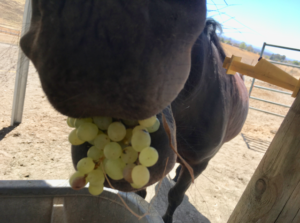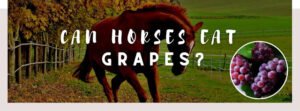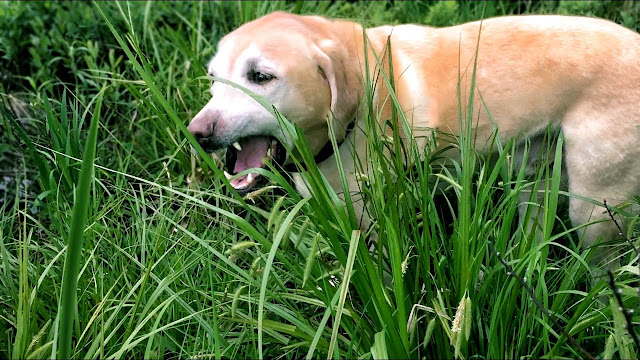Can Horses Eat Grapes?

While horses mainly flourish on hay and grass, they are naturally curious about trying new foods. Naturally, it’s tempting to offer your horse whatever it craves, but it’s crucial to understand which foods are safe and which are not. This leads us to a common question: Can horses eat grapes?
The short answer is yes. Horses are able to eat grapes. However, before introducing this new fruit into their diet, it’s crucial to understand how to do so safely. This guide is here to help. Within it, I’ve addressed all the potential questions you might have about feeding grapes to horses. Keep reading to learn more.
Nutritional Content of Grapes
Grapes are packed with vitamins and minerals that offer great benefits for horses. It’s no wonder these nutritious snacks are so popular with horses, thanks to their natural sweetness and sugar content.
The nutritional information for 100 grams of grapes includes:
| Nutrient | Amount per 100g |
| Calories | 69 kcal |
| Water | 81 g |
| Protein | 0.7 g |
| Carbohydrates | 18 g |
| Sugars | 15 g |
| Fiber | 0.9 g |
| Fat | 0.2 g |
| Vitamin C | 4 mg |
| Vitamin K | 14.6 µg |
| Vitamin B6 | 0.1 mg |
| Potassium | 191 mg |
| Magnesium | 7 mg |
| Phosphorus | 20 mg |
| Calcium | 10 mg |
| Iron | 0.4 mg |
The Health Benefits of Feeding Your Horse Grapes
Many pet owners worry about their animals eating grapes, but they are actually very good for horses. Feeding grapes to your horse can contribute to a well-rounded diet and enhance its overall health.
Here are a few key health advantages of giving grapes to your horse:
Hydration
Grapes are an excellent means to boost hydration in your horse’s diet. They consist mostly of water, making up 82% of their composition.
It’s crucial to keep in mind that grapes cannot substitute for water. Your horse should always have access to clean, fresh water to maintain proper hydration.
Energy
Grapes possess a naturally sweet flavor due to their sugar content. While it’s important to limit your horse to just a few grapes at a time, this minor sugar intake can provide an energy lift. This can be especially beneficial for horses during training sessions, but they may also appreciate the extra energy for their regular activities in the pasture.
Fibre
Thanks to their fiber content, grapes are excellent for your horse’s digestive system. While a small amount of grapes won’t drastically change its gut health, they can still be beneficial for aiding digestion.
Nutrients
Vitamin C is one of the key nutrients present in grapes. This natural health enhancer helps boost the immune system and overall well-being of your horse, making these sweet fruits a beneficial addition to their diet.
Antioxidants
Antioxidants play a crucial role in reducing inflammation and purging harmful toxins from your horse’s body. These toxins can accumulate gradually, especially as a result of intense training. Therefore, for owners of highly active horses, providing grapes as part of their diet can periodically help detoxify their systems.
Keep in mind that your horse can only safely consume a few grapes at once, so be careful not to overfeed them.
Potential Benefits of Feeding Grapes to Horses
When fed to horses in limited amounts, grapes can provide some nutritional advantages. These benefits include:
- Antioxidants Grapes have antioxidants that boost horse immunity and promote overall health. This includes substances like resveratrol, vitamin E, beta-carotene, and vitamin C, among others.
- Vitamins & minerals Grapes supply essential vitamins and minerals for horses, including vitamin K, copper, and potassium. These nutrients contribute to the health of bones, muscles, the heart, and the digestive system.
- Low calorie A single serving of grapes is low in calories, making it a low risk for weight gain. Additionally, grapes are composed of approximately 90% water.
- Taste & palatability – Many horses find the sweet flavor of ripe grapes delightful, making them a wonderful occasional treat that may entice even the fussiest eaters.
As with any indulgence, it’s important to enjoy these treats in moderation to safely reap their nutritional advantages.
Risks & Side Effects: Can Too Many Grapes Make a Horse Sick?
While the nutrients found in grapes can be beneficial for horses when given in moderation, feeding them too many can be harmful. grapes can make horses sick . Main risks include:
- Choking hazard Whole grapes are a significant choking hazard. Providing horses with too many whole grapes raises the likelihood of choking. It is important to always slice grapes before feeding them to horses.
- Colic & diarrhea Excessive consumption of sugary grape juice and skins can lead to digestive issues such as colic or diarrhea in horses.
- Toxicity & kidney failure – Grapes have acidic oxalates, which can be harmful and potentially result in kidney damage if consumed in large quantities.
- Obesity & laminitis – Consuming too many sugary, high-calorie grapes can lead to obesity, insulin resistance, and an increased risk of laminitis over time.

Overall the consensus is Horses ought to avoid consuming excessive amounts of grapes.Due to concerns about toxicity, it is advised to exercise caution. However, most veterinarians agree that offering a few sliced grapes occasionally as a treat is generally safe.
What is the Recommended Serving Size of Grapes for Horses?
If you decide to feed grapes to your horse, how much is safe? Here are some recommended guidelines for serving grapes to horses:
- Serving size Limit intake to 2-3 seedless grapes per week, equivalent to approximately 1/8 cup.
- Slice grapes Before feeding, always slice grapes in half or quarters to reduce the risk of choking; never offer whole grapes.
- Introduce slowly Initially, when you first introduce it into your diet, monitor for any digestive issues.
- Use caution If a horse has a history of choking, colic, laminitis, or kidney problems, it is important to consult a veterinarian to determine whether including grapes in its diet is suitable.
Similar to other treats, grapes should not make up more than 10% of a horse’s total daily caloric intake. For a horse weighing 1,000 pounds that consumes 2% of its body weight in dry matter per day from hay or feed, this 10% translates to about 4 ounces of treats per day. Giving 2-3 grapes is well within this safe limit.
5 Tips for Safely Feeding Grapes to Horses
Here are some guidelines for safely adding occasional grape treats to your horse’s diet:
- Always slice grapes First, to reduce the risk of choking on whole grapes
- Limit to 2-3 grapes Once per week to prevent toxicity or digestive problems.
- Pick seedless varieties since seeds can also present a choking risk for horses
- Introduce slowly Initially, be on the lookout for any subtle indications of reactions.
- Avoid raisins or dried grapes because their sugar content is too concentrated
Here’s the main point: Although many horses enjoy the sweet flavor of ripe grapes, it’s best to feed them in moderation when including this fruit in your horse’s treats.
How to Incorporate Grapes into Your Horse’s Diet Safely
You should also restrict the quantity of grapes you feed your horse to 10 – 20 grapes It might be advisable to distribute this amount over a period of time. over the week If you want to avoid causing a spike in your horse’s blood sugar levels, and at the same time ensure you’re providing your horse with appropriate care… one or two grapes at a time can assist in lowering the likelihood of experiencing digestive complications.
If your horse has never eaten grapes before, it’s best to introduce them gradually. Begin by offering just one or two grapes and observe how your horse responds before increasing the amount.
If your horse is already consuming other fruits, you should reduce the amount to about 5 to 10 grapes per week. Giving too many sweet treats can lead to sugar addiction and disrupt your horse’s dietary balance.
You have the option to give your horse either whole or halved grapes, depending on its chewing habits. Whole grapes can pose a choking risk, so if your horse tends to swallow treats quickly, it might be safer to cut the grapes in half. Additionally, make sure to rinse the grapes to wash away any pesticides or harmful chemicals that might be present on their skin.
It’s essential to keep in mind that regardless of the horse-safe treats you are giving, your horse should consistently have access to high-quality horse feed , hay, and fresh water available.
Should Horses Eat Grapes?
Your horse can enjoy grapes as part of its diet. When given in moderation, fresh grapes can be included in a balanced and healthy diet for your equine friend. However, similar to other fruits, there are certain considerations to keep in mind.
You Shouldn’t Feed Grapes to These Horses
Horses that are insulin-resistant should avoid eating grapes. Grapes have a high sugar content, which can cause significant increases in blood sugar levels. While a healthy horse might experience only minor blood sugar fluctuations from consuming too many grapes, diabetic horses could face much more serious consequences. In such situations, it’s advisable to opt for fruits with lower sugar content.
You might find it interesting that some horses can have an allergic reaction to grapes! Therefore, if you observe any unusual behavior after giving grapes to your horses, it’s a good idea to consult a vet or stop feeding them grapes completely.
How to Prepare Grapes for Horses
Getting grapes ready for horses is simple, but it’s important to be careful to make sure they’re safe and enjoyable for your horse. Here’s a brief guide:
Choose fresh grapes Begin with fresh, ripe grapes. Steer clear of any that are excessively soft, bruised, or display mold.
Wash thoroughly Rinse the grapes well under cold water to eliminate any pesticides, dirt, or other residues. This is particularly crucial if the grapes you’re using are not organic.
Cut for safety Even though grapes are small, it’s safer to cut them in half to reduce the risk of choking.
Remove the stems Before feeding grapes to your horse, be sure to remove all the stems because they can be a choking hazard and aren’t digestible.
Serve in moderation Grapes should be offered sparingly as a treat rather than a staple in the diet. A small portion, consisting of around 8 to 10 grapes, is sufficient. This helps avoid any digestive issues caused by excessive sugar intake.
Hand feeding Hand-feeding grapes to your horse can be an effective approach to build a stronger connection with them. Be cautious to keep your fingers away from their mouth to prevent accidental bites.
Monitor your horse In the initial instances of your horse consuming grapes, monitor it closely. Watch for any indicators of digestive problems or allergic reactions. If you observe anything out of the ordinary, seek advice from your veterinarian.
Horse Treats to Make with Grapes
Creating horse treats with grapes can be an enjoyable way to add variety to your routine. horse’s treat Add something fresh and nutritious to your routine. Here are a few easy recipes you can try:
1. Grape and carrot medley
Ingredients
- 1 cup of seedless grapes, halved
- 1 cup of carrots, diced
- 1 cup of apples, diced
Instructions
- Combine the halved grapes, chopped carrots, and diced apples in a bowl.
- Offer this fresh mix in your horse’s feed bowl as a unique treat during mealtimes or as a reward.
2. Frozen grape treats
Ingredients
- 1 cup of seedless grapes, either whole or cut in halves
- Water or unsweetened apple juice
Instructions
- Place the grapes in an ice cube tray.
- Fill the tray with water or unsweetened apple juice, making sure to cover the grapes.
- Freeze until solid.
- Take out some frozen treats and offer them to your horse for a refreshing snack on a hot day.
3. Grape and oat balls
Ingredients
- 1 cup seedless grapes, crushed
- 2 cups rolled oats
- 1/2 cup molasses
- 1/4 cup of flaxseed (optional for added nutrition)
Instructions
- Combine the crushed grapes, rolled oats, molasses, and flaxseed in a large bowl, stirring thoroughly until everything is well mixed.
- Shape the mixture into small balls roughly the size of a golf ball.
- Allow them to air dry on a baking sheet or solidify in the refrigerator.
- Feed them as a tasty hand-held treat.
4. Grape mash surprise
Ingredients
- 1 cup seedless grapes, halved
- 1 banana, mashed
- 1/2 cup chopped hay or alfalfa pellets
- 1/4 cup honey (optional)
Instructions
- Mix the halved grapes, mashed banana, chopped hay, and honey together in a large bowl.
- Stir thoroughly until the components are uniformly combined.
- Offer this mash as a special treat for your horse, ideal for providing a little extra hydration and nutrients to their diet.
Tips for Safely Feeding Grapes to Horses
Giving grapes to horses can be an enjoyable treat, but it’s crucial to do it correctly to prevent any health problems. Here are some guidelines to help you feed grapes to your horse safely:
Introduce gradually Begin by offering your horse a small number of grapes to observe their response in terms of taste and digestion. Slowly introducing new foods can prevent sudden dietary changes, which may cause digestive issues.
Feed in moderation Grapes contain a lot of sugar, meaning they should be offered as an occasional treat rather than a standard part of a horse’s diet. A suitable portion is a handful of grapes, which is approximately 8-10 grapes at a time.
Wash thoroughly Be sure to wash the grapes thoroughly before serving them to eliminate any pesticides, chemicals, or other impurities on their surface. This is especially crucial if the grapes are not organically grown.
Cut them up To reduce the risk of choking, particularly for smaller horses or ponies, slice the grapes in half. This will make them easier for the animals to chew and digest.
Observe for signs of allergic reactions.Although uncommon, some horses might exhibit an allergic reaction to grapes. After introducing grapes to your horse’s diet for the first time, monitor closely for any indications of trouble, such as hives, swelling, or gastrointestinal issues.
Check with your vet If your horse has specific health conditions, such as diabetes or a tendency to develop colic, make sure to talk to your veterinarian prior to adding any new food to their diet.
Avoid raisins Although grapes are generally safe when consumed in moderation, raisins (which are dried grapes) have a much higher concentration of sugar and should be avoided unless your veterinarian gives the go-ahead.
Use as a training aid Grapes, thanks to their small size and appealing taste, make excellent training rewards. You can use them to encourage and reinforce good behavior during training sessions.
Store properly Make sure to keep any leftover grapes out of your horse’s reach to prevent them from consuming too many at once.
Risks and Side Effects of Grapes on Horses
Although grapes can be a delicious snack for horses, they come with certain risks and possible side effects. Horse owners should be mindful of these dangers to maintain the health and well-being of their equine friends.
Sugar content Grapes contain a lot of sugar, which can be problematic for horses. Consuming a high amount of sugar can raise the risk of these conditions becoming more severe.
Choking hazard Because of their large size and smooth texture, whole grapes pose a risk of choking.
Digestive upset Horses have delicate digestive systems that are naturally adapted to processing grass and fibrous foods. Feeding them large quantities of fruits, such as grapes, can lead to digestive issues, including diarrhea and colic.
Allergic reactions Horses can occasionally have allergic reactions to various foods, including grapes, but these instances are uncommon.
Potential toxicity There’s an ongoing discussion and a lack of extensive research regarding grapes’ potential toxicity to horses. Despite this, it’s advisable to be cautious because of the uncertainties and differences in how individual horses might react.
Pesticide exposure If grapes are not thoroughly washed, there is a risk of pesticide residue, which can be detrimental to your horse’s health.
Symptoms of Grapes Poisoning in Horses
Although the potential harmful effects of grapes on horses haven’t been definitively established, it’s important to exercise caution and monitor closely when offering grapes to horses. If grapes were to lead to toxicity in horses, the symptoms could resemble those observed in other animals.
Here are some potential indicators you should be aware of that may suggest a negative reaction or poisoning:
- Gastrointestinal distress
- Lethargy
- Kidney issues
- Neurological signs
- Hypersensitivity reactions
FAQs
Can horses eat raisins?
If your horse consumes grapes, then it should be safe to also give it some raisins. However, due to the high sugar content in raisins, it’s important to offer them in moderation. For a slightly lower sugar option, you can purchase raisins made from green grapes, known as sultanas.
Should I feed my horse seeded or seedless grapes?
It is recommended to give your horse seedless grapes. Grape seeds may occasionally lead to digestive issues, such as bloating and discomfort, even though they are generally not a serious concern.
Can horses have frozen grapes?
Horses can enjoy frozen grapes and might particularly enjoy this cold treat during hot weather. If you’re preparing frozen grapes for your horse, place them in the freezer for a few hours or up to a day to ensure they are thoroughly frozen and have a crunchy texture.
Can horses eat frozen fruits?
Certainly! Here’s a paraphrased version of the paragraph: Horses can consume frozen fruits, but it’s important to let the fruits thaw before feeding them to avoid choking hazards or potential tooth damage. Fruits such as apples, melons, and berries can be particularly refreshing for horses, especially during hot weather.
Can horses eat carrots?
Horses can definitely eat carrots. These vegetables are nutritious and popular treats for them, supplying essential vitamins and fiber. To ensure safety, carrots should be washed and cut into small, manageable pieces to avoid any risk of choking.
Can horses have grape juice?
No, you should not give grape juice, wine, or jelly to horses. The high levels of sugar and acids can cause digestive problems, increase the risk of obesity/laminitis, or even be toxic if consumed in excess. Always avoid giving grape juice meant for humans to horses.
Can horses have grape vines?
No, horses should not consume grape vines. Various parts of the grape vine, such as the leaves and stems, could contain harmful substances for horses. It’s best to provide them with safe plant materials and always seek advice from a veterinarian if you are uncertain.
Can I give my horse grape vines or leaves to eat?
No, grapevines, leaves, and stems should never be given as food because they contain toxic compounds that can harm the kidneys, cause neurological symptoms like tremors, and potentially be fatal. You should only feed the grape fruit itself occasionally.
What amount of grapes can kill a horse?
Even a small amount, equivalent to 0.5% of a horse’s body weight, can be lethal if consumed in grapes. For a horse weighing 1000 pounds, this would mean just 5 pounds of grapes could lead to kidney failure and death. To be safe, restrict grape treats to 2-3 grapes per feeding, and do this no more than once a week.
Are raisins safe to feed my horse?
No, raisins and other types of dried grapes have a higher concentration of sugar and acid. This raises the risk of colic, diarrhea, laminitis, and toxicity, making them a hazardous option for treating horses.
What if my horse accidentally gets into the grape vines?
If a considerable amount of grapes or vines has been consumed, contact your veterinarian or the closest emergency equine hospital right away. Toxicity can cause symptoms like tremors, lethargy, diarrhea, or colic. Prompt and intensive IV fluid treatment can improve survival rates and reduce the risk of kidney damage.
Conclusion
In summary, the majority of horses are fond of sweet grapes, but they should be given only in strict moderation. It’s advisable to limit grape treats to 2-3 sliced grapes and no more than once a week. Horses should not consume vines, leaves, or raisins. When provided as an occasional treat and with caution, grapes can offer nutritional variety without risking the horse’s health. By following these guidelines, horse owners can safely address the question. can horses eat grapes? “Yes, grapes can be included in a horse’s diet if fed responsibly as part of a balanced nutritional plan.”
Greetings from the Petworled website management, we wish you success and see you in another article on our website.















